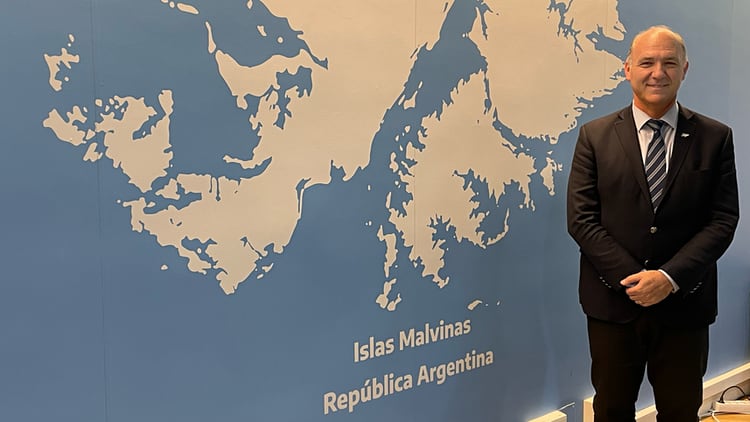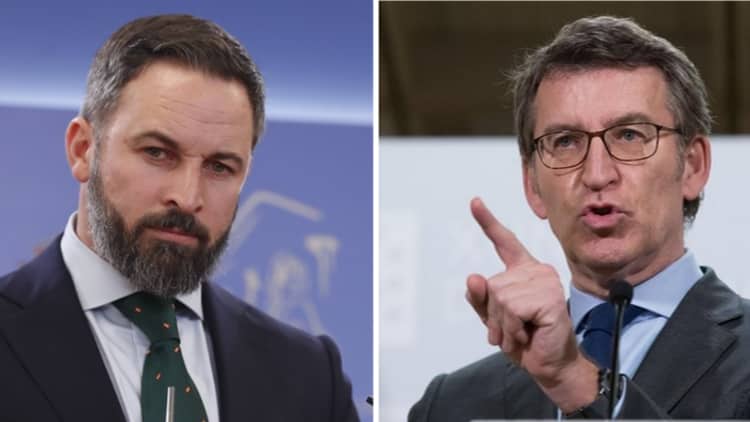Guillermo Carmona
Secretary for Malvinas, Antarctica and South Atlantic of the Republic of Argentina
Alberto Rubio
He barely spent 48 hours in Madrid, but they were very intense. The agenda of the Secretary for Malvinas, Antarctica and the South Atlantic, Guillermo Carmona, included fishing issues, scientific cooperation and, of course, the recovery of sovereignty over the Malvinas Islands, about which he was categorical, in conversation with The Diplomat in Spain: “If there is a state policy in Argentina, this is it”.
First you met with the Congressional Foreign Affairs Committee; then with the Polar Committee; then with the Director General for Latin America, Enrique Yturriaga, and the Director General for Economic Diplomacy, Ana Martínez, at the Ministry of Foreign Affairs; and finally with the Spanish Oceanographic Institute. Have you been able to stop for a second since you arrived?
The agenda with which I come has these three hats -Malvinas, Antarctica and South Atlantic- which in Argentina converge in a comprehensive approach. It is a very important strategic tripod for geographical, environmental and geopolitical reasons. In the case of Spain, we have Antarctic cooperation going back 40 years, with various lines of marine scientific research, conservation and marine protected areas.
Of course we address the Malvinas issue, also regarding Gibraltar, and some ocean policies especially linked to fisheries. Spanish investment in the Argentinean fishing sector is very significant. There are 24 companies and 90 vessels fishing under the Argentinean flag. But we have issues to resolve, such as illegal fishing in the Malvinas and in the adjacent area to the Argentinean exclusive economic zone, in which part of the Galician fleet is involved.
Are these licences granted by the UK?
The United Kingdom grants licences that Argentina considers illegal. The Resolution 31/49 of the UN General Assembly prohibits both countries from taking unilateral action in waters that our legislation considers our own. Therefore, this fishing is illegal. Taiwanese, Korean and Spanish vessels are mainly involved. There are also British vessels to a lesser extent and other flags, including the illegitimate flag of the islands. The presence of the Galician fleet is in breach of Argentine law.
What response did you get?
Very good. We are promoting a dialogue on these issues in the South Atlantic, where Spain is an important player, which will allow us to find a solution to these problems.
Have you been given any guarantee that this fishing activity will not continue?
In this I must be very careful and not speak on behalf of the other side, as we greatly appreciate the gesture of openness to dialogue. But I do believe that the Spanish Government is clear that this type of fishing is beginning to be seen as “plundering” in Argentine public opinion. This worries us in terms of bilateral relations. We need a response from the states. I don’t use that lexicon as my own, but the media already asks why Spain is accompanying us on the Malvinas issue while Spanish companies are violating our legislation.
There is growing concern about this situation, which has been going on for decades and the problem has been growing. The fact that there is a dialogue between the two governments allows us to prevent situations that could be inconvenient for the interests of Spain and Argentina.
Let’s talk about the Malvinas and sovereignty: has anything moved 41 years after the war?
I am rationally convinced that there will be, sooner rather than later, a negotiation on sovereignty. And I base this on an analysis of the international reality. The UK is an important country that sits on the Security Council, but on colonialism it has 10 open cases. This has an impact on its reputation because of the double standards in the handling of its international relations, which is also seen in its lack of respect for the rules in the Brexit process, notably in the Northern Ireland protocol.
If we follow the path of making this case of colonialism visible on the international agenda, it is clear that there is a situation pending and it is not just Argentina’s problem. In the sovereignty dispute we are two states, but in the case of decolonisation it is the whole international community that is involved. And this is an opportunity for Argentina.
I will give you an example: the case of Chagos. Three months ago the United Kingdom announced that it was opening a negotiation process with Mauritius over the sovereignty of Chagos. That was unthinkable before. It is the first time in more than 40 years that London has agreed to start a sovereignty process. I believe that Argentina will get the opportunity, the important thing is that it is prepared.
I would also like to underline two important details. First, it is not just that 40 years have passed since the war, but that there have been 190 years of British usurpation. In the face of this, we seek to highlight the consistent Spanish presence in the Malvinas prior to Argentine independence and ours until 1833. That British invasion in 1833 implied the displacement of the Argentine population and authorities and their replacement by a British population as part of a colonial strategy. A similar case to Gibraltar.
The second aspect I would like to highlight is the importance of the negotiation process between Argentina and the UK from 1966 to 1982. It is a very unknown process, even in Argentina. We came very close to reaching an agreement on four occasions. In all cases, the UK recognised that the starting point was the transfer of sovereignty to Argentina. That is very important because it overcomes the argument that they never wanted to give the Falklands back.
Did the possibility of oil exploitation make the deal impossible?
The Shackleton Report undoubtedly had an impact. And there was an important lobby, which was called ‘islanders’ but was actually London, of those who had investments in the Malvinas.
Argentina has, within the framework of the resolutions of the UN General Assembly and the UN Decolonisation Committee, a commitment to attend to the interests of the islanders. This implies the recognition of civil, social and economic rights for the inhabitants of Malvinas as for any Argentine: free education, free health care, equal working conditions and even recognition of the nationality of those born in Malvinas.
Could they have dual nationality?
There are already cases of Argentine-British dual nationality between current islanders. These aspects could be included in the negotiation framework, but there is no need. All they have to do is to apply for an identity card. The integration of those living on the islands, respecting their economic interests, investments, would not be a problem.
However, we Argentines cannot do in Malvinas what we could do in London: display national symbols. The first thing they say to an Argentine who arrives in Malvinas is “no national symbols”. We can also invest in the London stock exchange, but we cannot trade or invest in Malvinas, we cannot reside there. It is a pure colonial regime, which is different from Gibraltar, where there is a transit of people that enables other types of situations.
Any response from London?
We have been insistently raising the need to establish an effective link between the islands and the Argentine mainland. We have offered weekly flights with Aerolíneas. Now there is only one, via Punta Arenas, which has a monthly stopover in Río Gallegos, as agreed in the 1989 Madrid Agreements. The point is that, after 40 years, it is irrational that restrictions are still in place.
The 1971 Communications Agreement established a weekly flight between Malvinas and Comodoro Rivadavia. It was a period of great rapprochement. Unfortunately the war was a major setback. That agreement is still in force, but the United Kingdom does not agree to its implementation.
Could a mutual cost-benefit element be applied to boost the negotiation?
As long as the UK does not agree to negotiate sovereignty, this will not happen. When some form of cooperation on natural resource use was attempted, the British colonial position was consolidated. It happened with the national fisheries sub-commission and the hydrocarbons issue: they deepened their line of action and there was no more talk of sovereignty.
The UN ratified after the war that the sovereignty dispute was still in force. We have all the legal arguments while they seek to impose the de facto situation. We have diplomatic, economic and trade relations with the UK. But the intensity can never be optimal unless the sovereignty issue is resolved.
In this way bilateral route seems closed, so do you have confidence in the multilateral option?
There is a particularity. The dispute is between two states. There is no third party. As in the case of Gibraltar, London is trying to involve the inhabitants. But, as a decolonisation process, it involves the international community.
The Malvinas are no longer an overseas territory of the EU and this also opens up possibilities for us. The EU-Latin America summit issued a declaration last year urging the parties to seek a peaceful, negotiated and lasting solution. So, the Brexit somehow benefits Argentina.
Do you have any hope of recovering the islands?
More than hope, I have conviction. But there are four conditions for this: to persist with increasing intensity in our claim; to respect the South Atlantic as a zone of peace and cooperation declared by the United Nations, and where there are now Kosovar troops in Malvinas, as we have denounced; to consistently exercise our sovereignty where there is no dispute; and to be prepared to take advantage of the opportunities offered by the international scenario.







